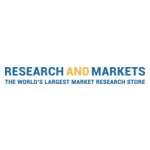DUBLIN–(BUSINESS WIRE)–The “Petrochemicals Global Market Report 2022” report has been added to ResearchAndMarkets.com’s offering.
The global petrochemicals market is expected to grow from $599.05 billion in 2021 to $629.73 billion in 2022 at a compound annual growth rate (CAGR) of 5.1%. The market is expected to grow to $761.59 billion in 2026 at a CAGR of 4.9%.
The main types of petrochemicals are ethylene-petrochemicals, propylene-petrochemicals, benzene-petrochemicals, xylene, styrene-petrochemicals, toluene, cumene, and other types of petrochemicals. Xylene is an aromatic hydrocarbon existing in three isomeric forms, all three being colorless flammable volatile liquids used as solvents and for manufacturing of synthetic resins, dyes, and insecticides, dimethylbenzene. The applications are polymers, paints and coatings, solvents, rubber, adhesives and sealants, surfactants, pigments and dyes, fibers and fabrics, and other applications. The end-user industries are construction, packaging, automotive and transportation, healthcare, electrical and electronics, and other end-user industries.
Asia Pacific was the largest region in the petrochemicals market in 2021. Middle East was the second largest region in the petrochemicals market. The regions covered in the petrochemicals report are Asia-Pacific, Western Europe, Eastern Europe, North America, South America, Middle East, and Africa.
The petrochemicals market is expected to benefit from growth in the automobiles industry during the forecast period. There is a drive for the production of automobiles which is leading to an increase in demand for petrochemical products that are used in the manufacturing of brake parts, radiators, and other components. For instance, the global motor vehicles market increased to $2,323.9 billion in 2019, at a CAGR of 6.7%, thus increased use of plastics in automobiles is expected to increase the demand for petrochemicals during the forecast period.
Oil price volatility is likely to have a negative impact on the petrochemicals market as significant decline and increase in oil prices negatively impact the government and consumer spending. The decline in oil prices is having a negative impact on government spending in countries such as Saudi Arabia, Nigeria, and the UAE (United Arab Emirates) which are largely dependent on revenues generated through crude oil exports, whereas a significant increase in oil prices had resulted in a spurt in inflation, current account deficit and fiscal deficit in countries such as India and China, which predominantly import oil.
For instance, the Saudi government is expected to cut down its spending from 1.05 trillion riyals ($280 billion) in 2019 to 1.02 trillion riyals ($270 billion) in 2020, to 955 billion riyals ($255 billion) by 2022, due to significant decline in revenues generated from oil exports, thereby affecting the market. This high volatility in the oil process is further expected to negatively impact the market going forward.
Many petrochemical manufacturers are adopting IoT (Internet of Things) technologies to connect equipment and smart devices to obtain real-time insights and identify inefficiencies in the manufacturing process. The data obtained is processed, analyzed, and interpreted by plant managers and senior-level management to improve quality and achieve optimum production levels. For example, smart systems give information on the working condition and performance of chemical reactors with embedded software and analytics tools to notify plant operators and managers of possible machine breakdowns.
Scope
Markets Covered:
1) By Type: Ethylene-Petrochemicals; Propylene-Petrochemicals; Benzene-Petrochemicals; Xylene; Styrene-Petrochemicals; Toluene; Cumene; Other Petrochemicals
2) By Application: Polymers; Paints & Coatings; Solvents; Rubber; Adhesives & Sealants; Surfactants; Pigments & Dyes; Fibers & Fabrics; Other Applications
3) By End User Industry: Construction; Packaging; Automotive & Transportation; Healthcare; Electrical & Electronics; Other End-User Industries
Key Topics Covered:
1. Executive Summary
2. Report Structure
3. Petrochemicals Market Characteristics
4. Petrochemicals Market Product Analysis
5. Petrochemicals Market Supply Chain
6. Petrochemicals Market Customer Information
7. Petrochemicals Market Trends And Strategies
8. Impact Of COVID-19 On Petrochemicals
9. Petrochemicals Market Size And Growth
10. Petrochemicals Market Regional Analysis
11. Petrochemicals Market Segmentation
12. Petrochemicals Market Metrics
13. Asia-Pacific Petrochemicals Market
14. Western Europe Petrochemicals Market
15. Eastern Europe Petrochemicals Market
16. North America Petrochemicals Market
17. South America Petrochemicals Market
18. Middle East Petrochemicals Market
19. Africa Petrochemicals Market
20. Petrochemicals Market Competitive Landscape
21. Key Mergers And Acquisitions In The Petrochemicals Market
22. Market Background: Chemicals By End Use Market
23. Recommendations
24. Appendix
25. Copyright And Disclaimer
Companies Mentioned
- JXTG Holdings Inc.
- Saudi Basic Industries Corporation (SABIC)
- Sinopec Limited
- Royal Dutch Shell
- Reliance Industries Limited
- LG Chem Ltd.
- Guardian Industries LLC
- Odebrecht Engenharia E Construcao SA
- Mitsubishi Chemical Holdings Corp.
- BASF SE
For more information about this report visit https://www.researchandmarkets.com/r/8ihdql
Contacts
ResearchAndMarkets.com
Laura Wood, Senior Press Manager
[email protected]
For E.S.T Office Hours Call 1-917-300-0470
For U.S./CAN Toll Free Call 1-800-526-8630
For GMT Office Hours Call +353-1-416-8900







